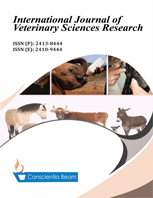Effects of Degasified Extender on Quality Parameters of Cryopreserved Bull Spermatozoa
DOI:
https://doi.org/10.18488/journal.110/2015.1.3/110.3.70.78Abstract
One of the most important factors contributing to poor quality semen post thaw has been reported to be oxidative stress. Continued interaction of spermatozoa with dissolved oxygen in extender renders detrimental effect by generating reactive oxygen species during processing. This formed the basis to investigate the effects of removal of oxygen from the Tris-Glycerol-Egg Yolk (TG-EY) extender on the post-thaw semen quality. Semen ejaculates (n=26) collected from three cross bred bulls with mass activity of ≥3 and progressive motility of ≥70% were split in two fractions (control and treatment) to obtain 80 x 106 progressively motile sperm/mL of extended semen. The TG-EY extender composed of 3.028 g of Tris, 1.675 g of citric acid, 1.25 g of fructose, 7.0 mL of glycerol, 10 mL of egg yolk, 105 IU Penicillin G Sodium and 105 µg Streptomycin for 100 mL of deionized water for control and degasified (freeze-pump-thaw cycling method using liquid nitrogen) for treatment. Semen was processed and filled in 0.25 mL polyvinyl chloride straws, sealed and cryopreserved for at least 2 week before evaluation. Assessment of post-thaw motility, viability, acrosome and plasma membrane integrity of spermatozoa were evaluated after thawing at 37°C for 30s. Study revealed a significant (viability and acrosome integrity, p<0.05) and highly significant (post-thaw motility and plasma membrane integrity, p<0.01) improvement in all the semen quality parameters in degasified as compared to control group. This study showed that degasification of extender prior to their use can serve to improve semen quality to highly acceptable levels.

